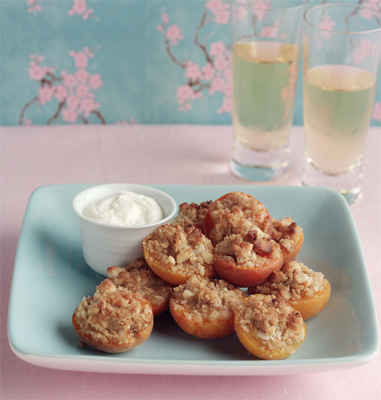Festive baked apricots stuffed with macadamias

Festive baked apricots stuffed with macadamias
Unhealthy saturated fats vs healthy unsaturated fats - can you spot the difference?According to Nuts for Life Consumer Research on Australian adults in 2008, many people are confused about dietary fats - what's healthy and what's unhealthy. While nearly three quarters of those surveyed (74 per cent) correctly understand that saturated fat is the unhealthy or 'bad' fat, most people are confused about the difference between the unsaturated fats - the monounsaturated and polyunsaturated fats.
So, what is the difference? And how can understanding the fats in your diet help you to shed those post-Christmas kilos and ensure better overall health in 2009?
Each type of fat is never found solely on its own in food sources. All three are usually present but in different proportions.
Saturated Fat:
Mainly found in food from animal origin; meat and dairy. An exception includes products made from plant based coconut and palm oil. The liver in our body can make blood cholesterol from the saturated fat we eat in our diet. High blood cholesterol is linked with an increased risk of heart disease.
Polyunsaturated (poly) Fat:
Derived mainly from plants; nuts, seeds, plus fish and seafood. Polys can be further classified as omega-3 and omega-6 fatty acids. Polys are needed for cholesterol lowering and heart health. Marine omega-3 fats are also needed for healthy brain function and for maintaining healthy joints. Walnuts, hazelnuts, pine nuts and brazil nuts are high in polyunsaturated fat.
Monounsaturated (mono) Fat:
Also mainly derived from plant-based foods; nuts, avocados, olives, canola and nut oils and eggs. Monos regulate blood cholesterol levels but not to the extent that polyunsaturated fats can. They can however raise HDL cholesterol- the 'good' kind that helps clear arteries. Macadamias, cashews, almonds, pistachios and pecans are high in monounsaturated fat.
Are nuts a source of healthy or unhealthy fat?
While tree nuts contain between 49 - 76 percent fat, with the exception of chestnuts which contain 0.5 percent, this does not mean they are unhealthy.
-The majority of fat comes from "good" fats - poly and mono, which help lower blood cholesterol levels and are good for your heart.
-Nuts are packed with vitamins, minerals and antioxidants, but most importantly for weight watchers they are also a source of dietary fibre and protein - two factors that are known to prolong feelings of fullness, thus helping to lower food consumption.
-To help manage your weight, substitute foods like biscuits, cakes, pastries and fried snack foods with fruit and nuts. Eating a variety of nuts will help provide the right balance of healthy fats in your daily eating plan.
Nutrition research has shown that eating just a handful of nuts (30g) most days can reduce the risk of heart disease, improve blood circulation and lower the body's blood cholesterol. In addition they help control hunger cravings. These delicious, crunchy foods are a great way to get healthy and stick to those New Year resolutions!
Ingredients
8 ripe apricots, halved and stone removed
50g raw macadamias, finely chopped
2 tablespoons reduced salt canola margarine
2 tablespoons brown sugar
2 tablespoons plain flour
1 teaspoon finely grated orange rind
ground cinnamon, for dusting
4 tablespoons reduced fat ricotta, to serve
Method
1.Preheat oven to 180C. Place the macadamias, margarine, brown sugar, flour and orange rind in a bowl and mix until fully combined (the best way to do this is with your finger tips).
2.Place the apricots cut side up in a baking tray lined with non stick baking paper. Spoon a little of the macadamia mixture into the cavity of each apricot then sprinkle with a little cinnamon.
3.Bake for 20 minutes or until caramelised and soft. Serve apricots with a dollop of low fat ricotta.
Serves 4.
Note : Drained canned apricots in natural juice may be substituted if fresh apricots are unavailable.
MORE



